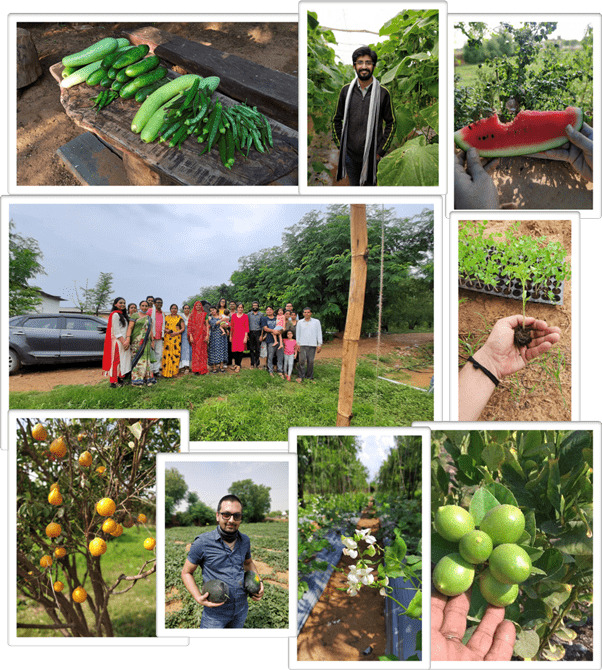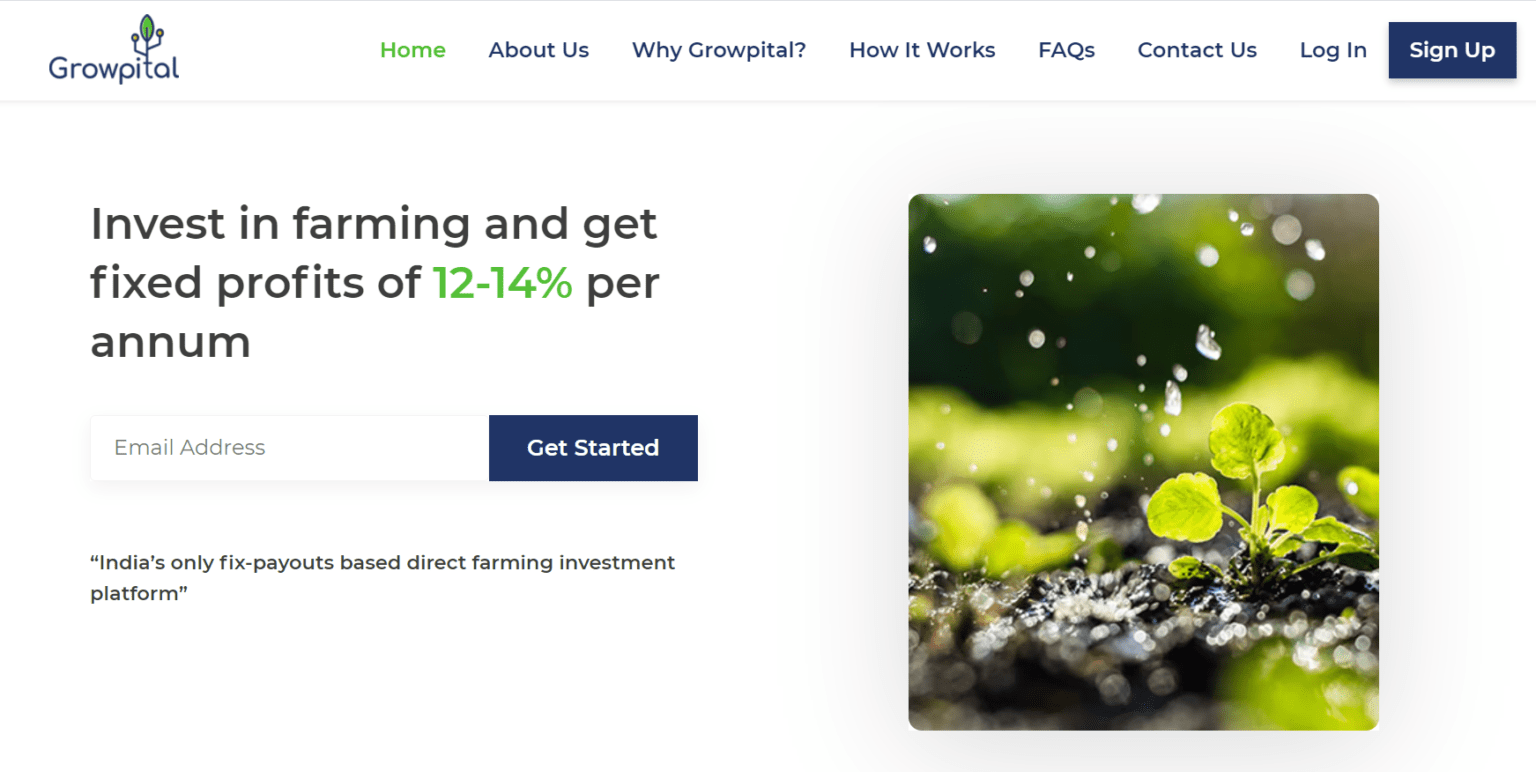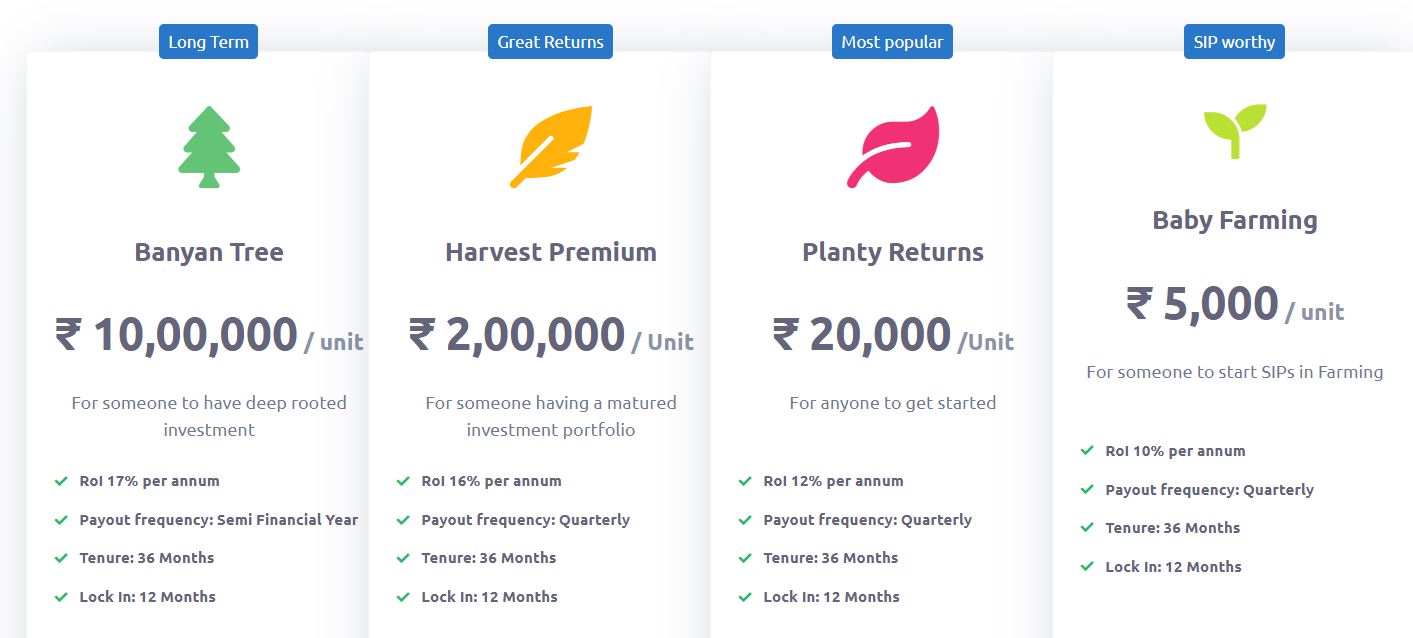Growpital, Agri-Investment Startup, Reports Impressive Rs 55 Cr Revenue in FY23 with Profits

Growpital, Agri-Investment Startup, Reports Impressive Rs 55 Cr Revenue in FY23 with Profits
Growpital, an agriculture investment platform, has experienced rapid growth since its establishment in 2020. What sets Growpital apart is its profitability, even amid its impressive growth.
During the fiscal year ending in March 2023, Growpital’s revenue from operations increased significantly, surging over 17 times from Rs 3.24 crore in FY22 to Rs 55.66 crore. This remarkable growth indicates the company’s success in attracting investors and expanding its services in the agriculture investment sector.
By offering a profitable platform and providing opportunities for investors to participate in agriculture-related ventures, Growpital has struck a chord with its target market. The platform’s ability to attract revenue while expanding its operations showcases its effective business model and management strategies.

As the agriculture sector plays a crucial role in India’s economy, investment platforms like Growpital have the potential to play a significant role in supporting agricultural development and generating returns for investors. With a track record of profitability and substantial revenue growth, Growpital is likely to continue its momentum and contribute to advancing the agriculture investment landscape in India.
Growpital, established in 2020 by Rituraj Sharma and Krishnna Joshi, operates as an agriculture investment platform. It allows retail investors and NRIs (Non-Resident Indians) to participate in commercial agriculture projects. Through this platform, investors can allocate their funds and resources to various agricultural tasks, effectively functioning as working capital for the company.
The invested funds are then utilized in various agricultural initiatives, and the projects are managed and supervised by a team of agriculture professionals and experienced farmers. This approach ensures that the agricultural projects are handled efficiently and effectively, enhancing the potential for successful outcomes.
By providing a seamless platform for investors to invest in the agricultural sector, Growpital not only facilitates investment opportunities but also contributes to the growth and development of the agricultural industry in India. With expert supervision and strategic allocation of funds, the platform aims to create a win-win situation for investors and the agriculture sector. The success and profitability of Growpital demonstrate the viability of this model and the positive impact it can have on the agriculture investment landscape in the country.

Growpital’s revenue model is based on selling the crop produce from the agricultural projects in which it invests the funds received from investors. This revenue is generated from the successful cultivation and sale of crops on the allocated agricultural land.
The platform offers a lock-in period of 12 months, which means investors must keep their funds invested for at least one year. In the event of early withdrawal before the lock-in period is completed, Growpital deducts all payouts from the original investment and returns the remaining amount to the investors.
Growpital offers tax-free fixed-profit sharing to attract investors, providing returns ranging from 10% to 15% on investments. These returns are in the form of agricultural income exempted under the Indian Income Tax Act. This tax-free income appeal aims to encourage retail investors to participate in agricultural investments through the platform.
Since its inception, Growpital claims to have raised over Rs 90 crore from more than 2,000 investors who have subscribed to its platform. The funds raised have been deployed across 3,500 acres of agricultural land, indicating the significant scale and reach of the platform’s operations.

In FY23, farming expenses, including the purchase of farm produce and other operational costs, accounted for nearly 94% of Growpital’s total expenses. This cost category experienced a significant increase, growing 15.6 times from Rs 3.17 crore in FY22 to Rs 49.34 crore in FY23. This substantial rise is likely due to the expansion of agricultural projects and the allocation of funds to a larger area of agricultural land.
Employee benefit costs also surged in FY23, jumping 13.4 times from Rs 8.8 lakh in FY22 to Rs 1.18 crore in FY23. As the company grew and scaled its operations, it likely hired more personnel to manage and oversee the agricultural projects, leading to higher employee-related expenses.
Another notable expense for the company was travel, which amounted to Rs 10 lakh during FY23. This expense and increased farming and employee costs contributed to the total expenses ballooning 15.9 times from Rs 3.3 crore in FY22 to Rs 52.6 crore in FY23.
Despite the significant rise in expenses, Growpital managed to maintain profitability, as stated earlier. The revenue growth and successful sale of crop produce have enabled the company to generate sufficient income to cover its expenses and remain profitable during the fiscal year ending in March 2023.

The rapid growth experienced by Growpital during FY23 had a significant positive impact on its profits. The company’s profit before tax surged multifold to Rs 3.05 crore in FY23, compared to a mere Rs 1 lakh in FY22. This substantial increase in profits can be attributed to the significant growth in revenue and the successful execution of agricultural projects.
On a unit level, Growpital’s efficiency is notable, as it spent only Re 0.95 to earn a rupee of operating income during FY23. This indicates that the company was able to manage its expenses and maximize its profits effectively.
As a player in the agriculture investment sector, Growpital competes with other platforms such as Upaj Farm and FAAB. These companies offer similar opportunities for retail investors to invest in agricultural projects and share in the profits from crop produce.
To mitigate risks associated with agriculture, Growpital claims to bear the risk in case of flood, drought, and other weather-related issues. Additionally, the company takes measures to reduce these risks by investing in a diverse range of crops across different states. Furthermore, it likely has insurance policies in place to provide additional protection against unforeseen events that could impact crop yields and financial outcomes.
Indeed, ventures like Growpital, which enable retail investors to invest in commercial agriculture projects, are gaining traction and are being taken seriously in the market. While this may yet to constitute a whole new investment category, the potential for growth and the demand for niche and exotic fruits and vegetables, in addition to staple crops, are driving the need for such initiatives.

In the agriculture sector, there is a growing recognition that small-scale farmers may need more capital or risk appetite to undertake large-scale agricultural projects. By providing a platform for retail investors to participate in agriculture investments, companies like Growpital bridge this gap and create opportunities for farmers to access much-needed funding for their projects.
As the market for agricultural investments evolves, regulatory surveillance and scrutiny are likely to increase. However, as long as companies like Growpital can demonstrate that they are operating sustainably and improving local livelihood opportunities, they can expect a supportive environment from regulators and stakeholders.




